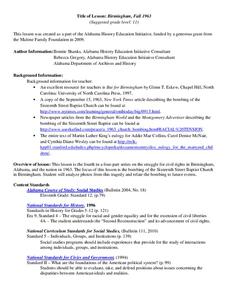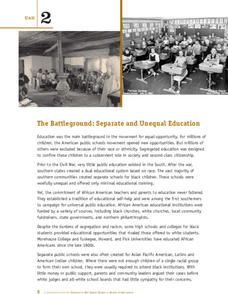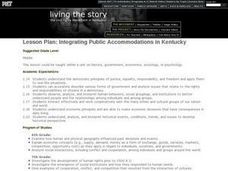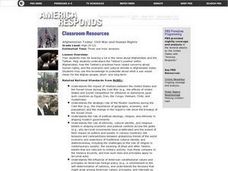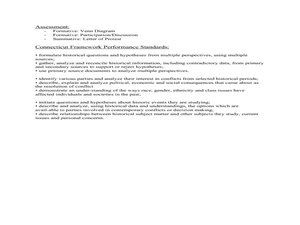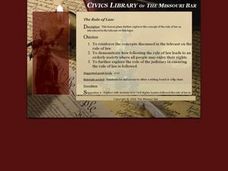Annenberg Foundation
Poetry of Liberation
How do writers use words to protest injustice, challenge the status quo, and shape their own identities? Individuals watch and discuss a video, read author biographies, write poetry and journals, develop a slideshow, and complete a...
Alabama Department of Archives and History
Birmingham, Fall 1963
Can any good come from acts of evil? The 1963 bombing of the Sixteenth Street Baptist Church in Birmingham, Alabama, and the eventual outcomes of the tragedy, are the focus of a lesson that asks groups to examine primary source documents...
Curated OER
Goals and Perseverance
Define the word perseverance to have learners understand why it is important in reaching goals. Young scholars research how Martin Luther King needed perseverance to accomplish his goals. They write acrostic poems using the word...
John F. Kennedy Presidential Library & Museum
Analyzing the Inaugural Address
Get high school historians to step outside their own shoes by responding to JFK's inaugural address from the perspective of a civil rights activist, a soviet diplomat, or a Cuban exile. After a class discussion about the address, the...
Curated OER
How Rosa Parks Sparked Change
Rosa Parks proves that one person, no matter their race, can make a difference.
Curated OER
The Battleground: Separate and Unequal Education
Students examine the purpose and goals of education in African American society. They analyze photos, answer discussion questions, and participate in a class discussion.
Curated OER
Integrating Public Accommodations in Kentucky
Students watch videos and conduct research on the belief systems and values related to segregation in Kentucky.
Curated OER
Credit to the Nation: Human Rights Cards
Students examine the lives of refugees. In this human rights activity, students use the provided refugee cards to play games that require them to learn details about the lives of the refugees.
Curated OER
Afghanistan Today: Civil War and Human Rights
High schoolers examine the relationship between the United States and the Soviet Union during the Cold War. They analyze the role of religion and cultural identity in shaping governments. They also examine the United States foreign...
Curated OER
Rosa Parks Refused to Do What?
First graders listen to two books about Rosa Parks. They contribute factual information for a web. They listen to an interview with Rosa Parks on the internet, adding more information to the web. They write and illustrate a book using...
Curated OER
Dr. Martin Luther King, Jr., a study in celebrating people
Learners analyze obstacles in their own life by studying Dr. Martin Luther King, Jr. In this humanity lesson, students create T-charts listing the obstacles one faces in life and how they can be overcome. Learners compare and contrast...
Center for History Education
Speaking Up and Speaking Out: Exploring the Lives of Black Women During the 19th Century
Young historians investigate the often-hidden history of free and enslaved African American women before the Civil War. Using a collection of primary and secondary sources, including speeches, diaries, and poems, they evaluate the often...
Teaching Tolerance
Racial Disparity in the Criminal Justice System
Explore the impact of the war on drugs in a thought-provoking lesson plan for high school academics. Young historians delve into the world of the criminal justice system and the racial disparity that occurs in the US. The resource...
National Woman's History Museum
Ida B. Wells: Suffragist and Anti-Lynching Activist
Suffragette, investigative journalist, and civil rights activist Ida B. Wells is the focus of a lesson that has young historians study the work of this amazing woman. Scholars watch a video biography of Wells, read the text of her speech...
PBS
Amid Rising Economic Inequality, Does America Need a Third Reconstruction?
Young political scientists investigate the Poor People's Campaign protest held in Washington, D.C., on June 18, 2022. They research how the event was reported in various news outlets and consider their stance on whether "poverty is...
Curated OER
The Civil Rights Movement in Kentucky
Eleventh graders examine how current race relations in their town compare to those of the 1960's.
Curated OER
Martin Luther King, Jr. vs. Malcolm X
Eleventh graders compare and contrast the visions of Martin Luther King, Jr. and Malcolm X. In this African-American history lesson, 11th graders read speeches by each of the men and summarize the arguments made by each of them about...
Curated OER
Social Life in the 1950's and Domestic Politics and Policy
Eleventh graders examine the cultural mood and politics of the 1950's in the United States. They read a section of their text and take notes, view a clip of the movie "Pleasantville" and discuss societal roles in the 1950's, and listen...
Curated OER
Celebrating 100 Years of Negro Leagues Baseball
Ninth graders locate original locations of Negro Leagues Baseball teams using latitude and longitude, calculate distances between locations using maps and/or Internet resources, and use critical thinking skills to compare and contrast...
Curated OER
How Women Got the Vote: The Story of Carrie Lane Chapman Catt
Students participate in a simulation and compare and contrast the arguments for and against womens' right to vote. In this civil rights lesson, students simulate disenfranchisement of women by allowing only half of the class to vote on a...
Beacon Press
A Time to Break Silence
Encourage teenagers to get involved in ending violence among young people. A Common Core-aligned resource and curriculum guide, designed to be used with a reading of A Time to Break Silence: The Essential Works of Martin Luther King,...
Curated OER
Civics: The Rule of Law
Students examine key concepts pertaining to the rule of law. They explore how Civil Rights leaders such as Martin Luther King, Jr. used it to oppose discrimination practices. They examine Supreme Court decisions demonstrating the...
Curated OER
The Sixties Protests and Social Change
Students identify, examine and analyze photographs of the sixties to determine the forces of social change at work in America during this decade. They determine the goals of each movement and the methods used by each to achieve those goals.
Curated OER
Thoreau, Gandhi, and Martin Luther King, Jr.
Students explore the concept of non-violent resistance. In this political philosophies lesson, students study the political tactics of Mohandas Gandhi, Henry David Thoreau, and Martin Luther King, Jr. in order to discover how each of...
Other popular searches
- Civil Rights Movement Music
- American Civil Rights Movement
- 1960's Civil Rights Movement
- Jfk Civil Rights Movement
- U.s. Civil Rights Movement
- Us Civil Rights Movement
- Jr. And Civil Rights Movement
- 1960s Civil Rights Movement
- Civil Right Movement Kit
- Jr and Civil Rights Movement
- Civil Rights Movement Unit
- The Civil Rights Movements



